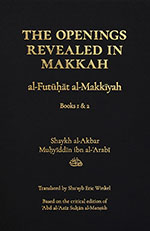The Futūḥāt Project
↓ Contents of this subsection
About the project
News
Quotations from the Futūḥāt
This subsection is dedicated to the Futūḥāt Translation Project. The Project is independent of the Muhyiddin Ibn Arabi Society, but is of great importance and of immediate interest to the Society and its members. The Society is glad to host these pages, which are maintained by the Project.
FROM THE QUOTATIONS PAGE
You are a cloud veiling your Sun, so recognize first a truth of yourself.
(al-Isrāʾ, quoted in Futūḥāt, Book 1)
PROJECT NEWS
Current Status
Volume 1 (containing Books 1 & 2) was published in hardback by Pir Press in March 2019. Volumes 2, 3, 4, 5, 6, and 7 are also now available, each containing two books – that is, 14 of the 37 books have now been published.
Sample Chapters
Sample chapters from the published volumes, which contain the same typesetting as the hardback volumes.
TO BUY VOLUMES OF THE TRANSLATION
Published volumes of The Openings Revealed in Makkah can be purchased from Pir Press [/].
There is not in all possible worlds
any more wondrously original than this world.
Ibn al-ʿArabī
About | News | Quotations
This subsection is dedicated to the Futuhat Translation Project. The Project is independent of the Muhyiddin Ibn Arabi Society, but is of great importance and of immediate interest to the Society and its members. The Society is glad to host these pages, which are maintained by the Project.
The Openings Revealed in Makkah (al-Futūḥāt al-Makkīyah) was handwritten in a second edition by Ibn al-ʿArabī a few years before he died in 1260. Sitting with a dozen or so people, he spoke and read from notes to himself while the writing proceeded, in different houses, over a period of three years. The audience checked the folios, and one, Umm Dalāl, was given authority not only to transmit (copy) the work but also to teach it. It is widely recognized in Islamic and Sufi studies as the greatest work of the “greatest master” (shaykh al-akbar) and has had an enormous influence in the Arab-speaking world for centuries.
 The Translator
The Translator
Dr. Eric Winkel was first “cast onto the path”, as Ibn al-ʿArabī would say, by Ralph Austen’s Sufis of Andalusia. He had been reading Michel Foucault and discovering how to look at the marginal people on various ships of fools in order to understand better what was going on in the mainstream. When he encountered the strange and wondrous people populating Ibn al-ʿArabī’s Andalusia, he knew that he had found answers to his questions. At 17 years of age, he proceeded to delve into Ibn al-ʿArabī’s works as much as he could.
When writing his dissertation, Dr. Winkel had to skip over Ibn al-ʿArabī—he felt that he just did not have an adequate grip on what the shaykh al-akbar was saying. Over the following years, he had the great good fortune to be able to study with Arabic experts, one on one. General language classes would not have worked; he was interested in the nuances of medieval Arabic and in reading the ʿarabī language of the Futūḥāt.
Newcomers to the works of Ibn al-ʿArabī may not appreciate just how important and nourishing the MIAS web site was in the early days—and still is. Although intellectual and academic standards were and are always met, Dr. Winkel felt that the site was clearly created by, and for, seekers like himself. He is immensely grateful to all who have contributed to it and helped foster a deeper understanding of Ibn al-ʿArabī’s teaching.
While holding the position of Senior Research Fellow at the Institute of Advanced Islamic Studies, Dr. Winkel explored connections between Islam and the “new sciences”. He then produced two articles for the Journal of the Muhyiddin Ibn Arabi Society laying the groundwork for this connection between Ibn al-ʿArabī’s vision and new directions in physics and mathematics:
Understanding, and translating, the Futūḥāt al-Makkīyah
Time Is Not Real: Time in Ibn Arabi, and from Parmenides (and Heraclitus) to Julian Barbour
Dr. Winkel holds weekly dars sessions on Ibn al-ʿArabī and the Futūḥāt, which are recorded and later posted on YouTube at The Futūḥāt Project [/].
 The Futūḥāt Project
The Futūḥāt Project
As time went on, Dr. Winkel was, as Ibn al-ʿArabī would say, “reading only one book”: the Futūḥāt, front to back, back to front. In 2012, the idea to concentrate full-time on translating the book arose. Stephen Hirtenstein of the MIAS kindly put him in touch with Abd al-Aziz Sultan al-Mansoub, editor of the first complete critical edition of the Futūḥāt. Sidi Mansoub very graciously sent Dr. Winkel the critical edition from Sana’a in Yemen. This edition contains 37 books. For a review by Dr. Winkel of Dr. Mansoub’s critical edition of the Futūḥāt al-Makkīyah, published in the Journal of Islamic Studies (2012), click here.
And so the odyssey began. For several years it was just Dr. Winkel working alone. Eventually he published a set of pre-prints, to receive feedback from others interested in Ibn al-ʿArabī and to make it known that the translation was substantially under way. Then Shaykha Fariha and Pir Press in New York arrived to fully embrace the project’s aim to understand, translate, and convey the extraordinary riches of the Futūḥāt to a wide readership.
Later, Ruadhan Hayes found us; he wrote out of the blue one day, very politely, “Would you like some editing help?” Initially the editing was done on a voluntary basis in his free time, but it gradually became clear that this was a task requiring full-time commitment. The text undergoes multiple editing passes and travels a long way from the initial pre-prints. On average so far, there have been 11,000 changes per book and many hundreds of re-workings for greater clarity.
After the text editing, the volumes are typeset by Dr. Winkel in a two-colour format intended to enhance the reader’s experience of Ibn al-ʿArabī teaching. This typesetting is a significant phase of the publication project and requires much care and attention, far beyond what is involved for an ordinary book. Finally, Dr Winkel’s mother, Carol Winkel (fifty years of teaching English) makes a last proofreading pass before publication by Pir Press.
And so, as if by magic, the project has passed from Dr. Winkel and an idea that mysteriously arose, to a dedicated team of people, all focused on conveying the message Ibn al-ʿArabī himself was commanded to convey in The Openings Revealed in Makkah.
There is not in all possible worlds
any more wondrously original than this world.
Ibn al-ʿArabī

 The Translator
The Translator The Futūḥāt Project
The Futūḥāt Project